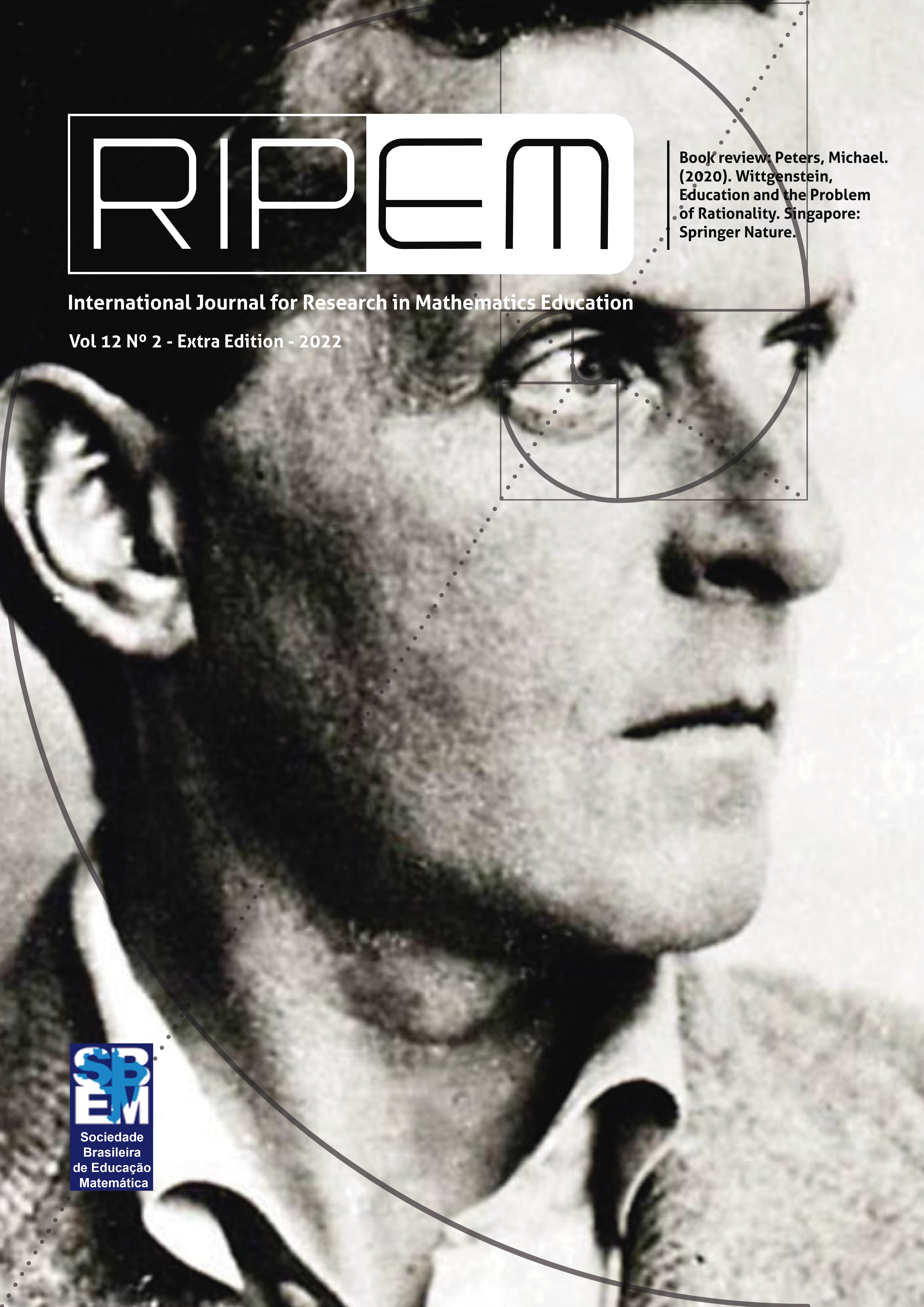Wittgenstein’s Antifoundationalism: a response to Cristiane Maria Cornelia Gottschalk
DOI:
https://doi.org/10.37001/ripem.v12i2.2989Palavras-chave:
Wittgenstein, Mathematics Education, Book ReviewResumo
Michael Peters writes “Wittgenstein’s Antifoundationalism: a response to Cristiane Maria Cornelia Gottschalk” to assert that one is always indebted to those who take their work seriously and engage in serious disputes over readings and arguments. For Petters, Cristiane Gottschalk advances in three aspects of disagreement: (i) the appropriation of Wittgenstein’s philosophy by analytic philosophers of education; (ii) the status of Wittgenstein’s spelling dictionary; and (iii) Wittgenstein's anti-foundationalism. Thus, he discusses and presents his arguments on the three arguments in his text.
Downloads
Referências
Davidson, D. (1986). A Coherence Theory of Truth and Knowledge. In Truth and Interpretation: Perspectives on the Philosophy of Donald Davidson, ed. E. LePore. Oxford: Blackwell.
Hasan, A. & Fumerton, R. (2018) Foundationalist Theories of Epistemic Justification. Zalta, E. N. (Ed.) The Stanford Encyclopedia of Philosophy . Fall 2018 Edition.
Peters, M. A. & Marshall, J. (1999) Wittgenstein: Philosophy, postmodernism, pedagogy. Bergin and Garvey.
Peters, M. A.; Burbules, N.; Smeyers, P. (2008/2015) Saying and doing: Wittgenstein as a pedagogical philosopher. Paradigm Press.
Peters, M. A.; Stickney, J. (2017) (Ed.). A companion to Wittgenstein on education: Pedagogical investigations. Singapore: Springer, 2017. P. 79-100.
Peters, M. A.; Stickney, J. (2018) Wittgenstein’s Education: “A Picture Held Us Captiveâ€. Springer Brief Series on Key Thinkers in Education, Paul Gibbs (Series Editor). Singapore: Springer Nature.
Peters, M. A.; Stickney, J. (2019a) Philosophy of Education 1945-2010 and the ‘Education of Reason’: Post-foundational approaches through Dewey, Wittgenstein, and Foucault. In: Thomson, Iain; Baker, Kelly Michael (Ed.). Cambridge History of Philosophy. Cambridge University Press
Peters, M. A.; Stickney, J. (2019b) Wittgenstein at Cambridge: Philosophy as a way of life. Educational Philosophy and Theory, v. 51, n. 8, p. 767-778.
Peters, M.A. (2002) Wittgenstein, Education and the Philosophy of Mathematics, Theory and Science, 3 (2).
Peters, M.A. (2017) Wittgenstein’s trials and teaching and Cavell’s romantic “figure of the childâ€. In A contrario Volume 25, Issue 2, 2017, 13 -37.
Peters, M.A. (2020) Language-games philosophy: Language-games as rationality and method, Educational Philosophy and Theory, DOI: 10.1080/00131857.2020.1821190
Peters, M.A. (2020) Wittgenstein, Anti-foundationalism, Technoscience and Philosophy of Education. An Educational Philosophy and Theory Reader Volume VIII. Routledge.
Rodych, V. (2018). Wittgenstein's Philosophy of Mathematics. In.: Zalta, E. N. (Ed.) The Stanford Encyclopedia of Philosophy. Spring Edition. URL https://plato.stanford.edu/archives/spr2018/entries/wittgenstein-mathematics.
Williams M. (2000) Is Wittgenstein a foundationalist? https://www.nyu.edu/gsas/dept/philo/courses/rules/papers/WilliamsFoundationalist.pdf
Williams M. (2005) Why Wittgenstein Isn’t a Foundationalist. In: Moyal-Sharrock D., Brenner W.H. (eds) Readings of Wittgenstein’s On Certainty. Palgrave Macmillan, London.
Publicado
Como Citar
Edição
Seção

Este trabalho está licensiado sob uma licença Creative Commons Attribution-NonCommercial-NoDerivatives 4.0 International License.








